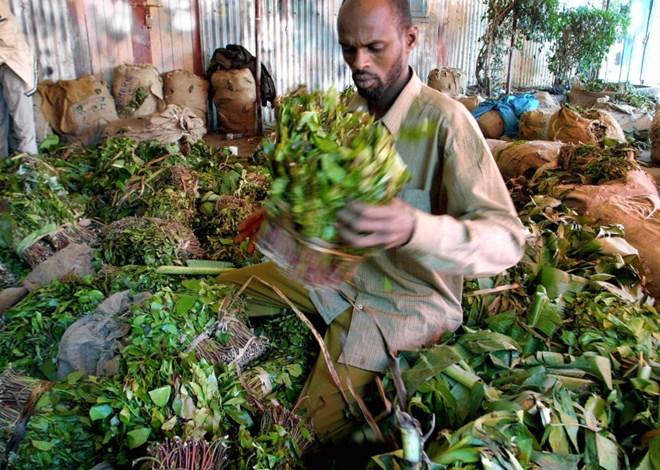Saturday, August 29, 2020
By Abukar Awale

A Somali trader takes khat, a mild narcotic drug meant for exports to Somalia, out of bags, 21 June 2003 at the small Wilson airport in Nairobi. AFP PHOTO/SIMON MAINA (Photo credit should read SIMON MAINA/AFP/Getty Images)
There has been recent news filtering on print and social media asserting that the Somali government under the leadership of Mohamed Abdullahi Farmaajo has issued political and economic prerequisites to Kenya before Khat importation to Somalia can resume again. It would be relevant to contextualise the issue for the Somali government and the wider public. In my view, this is a bold move from our government, a departure from the past where Kenya pull many levers to wash the Somali market with unlimited khat at will without tangible return for our citizen’s interest.
https://www.businessdailyafrica.com/economy/Somalia-sets-miraa-ban-lifting-terms/3946234-5614132-view-asAMP-12flmpg/index.html?__twitter_impression=true
While these conditions are relevant, I warn our government not to be naïve in the face of pressure. Kenya has a history of not abiding by previous agreements. Any bilateral agreement reached with Kenya is not worth the paper on which it is written. There is a precedent here – In September 2016, Kenya agreed to allow Mogadishu flights en route to Nairobi to fly direct to Jomo Kenyatta Airport, Nairobi. Within months, a directive was issued by the Kenyan government requiring all Somali citizens - including politicians, diplomats, business- people and citizens alike - to go through Wajir Airport. The directive effectively labelled every Somali citizen at every level of society a perceived security threat before they enter mainland Kenya. The demand is still causing untold suffering to Somali citizens. For many, this has meant losing them money, delaying essential medical treatment, family reunion and added daily humiliation of having to queue in the dead heat of Wajir Airport while their bags are doubled checked. The move was and is disproportionate humiliating behaviour by Kenya’s government.
Now Kenya Government wants to pretend they can be trusted again – AKUNNA MATATA, (no problem). My advisory note to our Somali government is to refrain from trusting Kenya’s government. They are a source of instability in Somalia, fuelling political instability in Jubaland, claiming Somalia’s territory and maritime ocean while also selling/Buying Charcoal from Al-Shabaab, an internationally verified matter by the UN Monitoring Group (report 2019) in Somalia and Eretria.
Furthermore, Kenya has consistency attacked Hormuud Telecommunication business installations. Hormuud is the biggest Somali employer, the biggest taxpayer, and an essential backbone for the Somali economy. The Kenyan government Airforce has destroyed the lives of many and has caused damage worth over $200 million. This behaviour has displaced 4,000 innocent Somali villagers and pastoral communities who rely heavily on mobile money services. Suppose we reflect on our true Somali instincts and reflect on the evidence before the international community and us. In that case, we will conclude Kenya’s is a spoiler pariah State in the internal affairs of Somalia. It is within this context the Somali government must set its conditions and responses by first protecting its citizens and businesses from harm from khat use and attacks.
The COVID19 government measures have allowed Somali citizens to reflect and pursue other avenues in the area of artist culture and recreational sports such as football and basketball. Somalia is turning a cultural page, and our government should provide the political space and leadership to sway our society from the evil of khat use/ abuse. It starts with banning khat altogether from Kenya, the beginning of a new chapter in Somali free from the corruption of khat and associated menace in society.
After decades of instability and war, Somalia and its people want to put a long history of misery behind them, and it is high time our government forge a new approach to governance by investing in human capital. The building blocks of good governance and progressive future is an inevitability about fostering a vibrant, vigilant and outward-looking society for all. In this endeavour, Khat use/abuse has no place in this forward-looking and dynamic future.
A belligerent Kenyan Government should not be trusted or rewarded at the expense of our children, mothers, businesses and society at large.